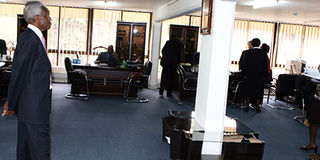Kiplagat now an isolated man

TJRC chairman Bethuel Kiplagat at his office at Delta House, Nairobi, shortly after his commissioners agreed to have him investigated. Photo/WILLIAM OERI
What you need to know:
- Drama as truth team tells Kiplagat to step aside and requests a tribunal to try him
Truth, Justice and Reconciliation Commission chairman Bethuel Kiplagat on Tuesday lost the support of the entire commission, putting in jeopardy his tenure.
The commissioners wrote to the Ministry of Justice informing it that Mr Kiplagat had agreed to step aside and asked Justice and Constitutional Affairs Minister Mutula Kilonzo to ask the Chief Justice to form a tribunal to investigate the chairman.
All commissioners, including Mr Kiplagat himself, signed the letter, the result of what commissioners said was unanimous vote.
Meeting ‘bedlam’
Agreement was reached on Monday, commissioners said, and a decision taken to call a press conference on Tuesday to make the announcement.
However, one commissioner, who asked not to be named discussing the proceedings of the closed-door session, described Tuesday’s meeting as a “bedlam”.
Mr Kiplagat had apparently modified his stand about stepping aside, which did not go down well with the rest of the team, according to the commissioner.
The commissioner said they felt they had now been pushed to a corner and were “confused”.
And it later emerged that Mr Kilonzo had returned the letter to the commission, saying he had “no role to play in the matter”. He asked that it be directed to the appointing authority, President Kibaki.
In Parliament, MPs differed on whether Mr Kiplagat had the credibility to continue leading the commission, formed to reconcile the country after the 2007 election violence and investigate past violations of human rights.
Many of the allegations levelled at Mr Kiplagat relate to his service in the Moi government, which stands accused of some of those violations.
Restore confidence
Ikolomani MP Boni Khalwale wanted to know what the government was doing to restore the confidence of Kenyans in the TJRC process, following the resignation of the vice-chairperson, Ms Betty Murungi.
In returning the letter to the commissioners, Mr Kilonzo asked that it be accompanied by evidence to support the complaint.
“I have no single complaint on my desk about the misdeeds of the TJRC boss. We cannot rely on media reports,” Mr Kilonzo said.
If the President grants the request, then he will have to suspend Mr Kiplagat until he is cleared by the tribunal. At the Monday meeting, it was agreed that Mr Kiplagat steps aside and his deputy, Ms Tecla Namachanja chairs the commission in his absence.
In its letter, the commission said the allegations against the chairman relate to the murder of former Foreign Affairs minister Robert Ouko, the Wagalla massacre and illegal or irregular acquisition of land.
“We write to request this tribunal so that the commission may move forward with its work. With that aim in mind, our chairman has graciously agreed to step aside temporarily until the tribunal process has reached its conclusion,” said the letter.
But addressing a press conference on Tuesday, Mr Kiplagat insisted that he would only step aside once the tribunal was formed and also if the law required him to do so.
“If the tribunal is agreed upon and established, I will follow the rule of law, if the law says I step aside, I will step aside,” he said.
Mr Kiplagat had on Monday refuted reports that the commissioners had resolved to push for the formation of a tribunal to investigate him.
“We have not (agreed on a tribunal). No! No! No!” he told Nation before disconnecting the line.
Another commissioner told the Nation that the other commissioners were taken aback on Tuesday after Mr Kiplagat appeared to go back on his earlier promise to step aside.
“We are a bit disappointed that he seems to change his mind; he had agreed to step aside when we met yesterday,” said a commissioner who declined to be identified by name.
Contacted, Mr Kilonzo said the commission was at liberty to take any decision to resolve the problems facing its work.
“We have made it clear that we will not interfere with the TJRC. If they cannot resolve their problems internally and choose the tribunal, all is well. We want the commission to work,” the minister said.
A commissioner who attended the Monday meeting said they reached the decision to investigate their chairman to give the TJRC the required credibility to investigate past injustices.
The Nation learnt that commissioners Tom Ojienda, Ahmed Sheikh Farah, Ms Namachanja and Berhanu Dinka presented the proposal at the meeting.
Other commissioners are Ms Betty Murungi, Ms Margaret Wambui Shava, Prof Ronald Slye of the United States and Zambia’s Gertrude Chawatama.
All the commissioners were present during yesterday’s press conference save for Ms Chawatama.
The Truth, Justice and Reconciliation Act sets out the procedures for the removal of the TJRC chairman or commissioner.
Reads section 17 (2) says: “Where the question of the removal from office of the chairperson or a commissioner arises, the Chief Justice shall, by notice in the Gazette, appoint a Tribunal which shall consist of a chairperson and two other members selected by the Chief Justice from among persons who hold or have held office as judges of the High Court.”
The tribunal will then investigate the matter and report its findings to the CJ stating whether the commissioner under investigation ought to leave office or not.
The CJ will in turn forward the recommendations to the President for necessary action.
The law also says that the President may suspend the chairperson or the commissioner from the Commission while he or she is under investigation by the tribunal.
Mr Kiplagat has consistently denied that he was involved in past injustices.




